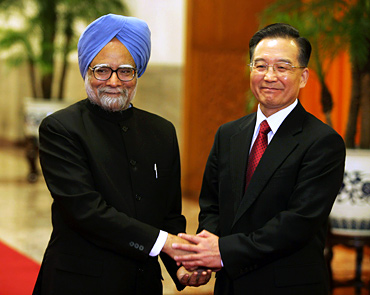First, the reality of an unprecedented global economic downturn and absence of any recovery in 2009 should now be recognized. The impact on India’s economic prospects for this year and the next should be carefully and urgently worked out. There is currently lack of real appreciation amongst Indian policy and opinion makers of the severity of the global economic downturn. Some, like Surjit Bhalla, continue to insist that India’s economic performance in 2009 will be better than in 2008. This is dangerous because it diverts attention from the measures that need to be taken to try and mitigate the impact of the global downturn and prevent domestic demand plummeting. The implementation of public sector infrastructure projects needs to be put on a mission mode. If the previous home minister can held accountable for the Mumbai debacle, those in charge of infrastructure and economic ministries should also be held accountable for their poor performance and compromising the country’s economic security Better to take action now, rather than wait for the young, educated and unemployed taking to the streets. It does not take long for demographic dividend to be converted to a demographic crisis.
The second implication is that the government needs to use this window of low global oil prices to take the much needed step of decontrolling the prices of petroleum products. This will remove, once for all, this vexed issue from the realm of partisan politics. There is a cabinet decision of May 2003 to dismantle the administered oil price mechanism. This was held in abeyance first by the NDA government and thus by the present government. It is disingenuous to argue that dismantling oil price controls will harm the poor. Deserving beneficiaries, who do not by any stretch of imagination include motorcycle and car owners, can be easily protected by properly targeting the subsidy through either cash transfers or a system of smart ration cards. These will permit them to secure their supplies of kerosene and LPG at lower prices from all designated outlets that would be directly subsidized by the government. Price decontrol, along with the assurance that it will never be brought back, will attract domestic and foreign investment in all the segments of the petroleum sector. Getting rid of oil price controls will contribute to improving the investment climate directly and also boost business confidence in general. So this should be announced now, along with a further price cut.
The third implication is that the economy needs to be closely monitored so there is advance action rather than a reactive response to worsening conditions. In the unfortunate absence of a full-time finance minister, a mechanism should be established under the Prime Minister to monitor the implementation of the stimulus package and also to undertake some much needed reforms. Such monitoring would for example have revealed that non-food credit has actually contracted both in November and December. The contraction has been of the order of Rs 30000 crore compared to October levels. On Friday 16 January, commercial banks parked nearly Rs 39 000, under the reverse repo window, which is more than seven times the amount (Rs 5035 crore) borrowed from the RBI at repo rates. This amply demonstrates commercial banks inability or unwillingness to advance credit. It is important at this stage for the RBI and the government to discuss with the banks the reasons that are preventing banks from advancing credit despite the liquidity that is now at their disposal. Simply ordering the banks to lend more will only increase the share of directed lending which inevitably results in rising levels of non-performing assets. RBI needs to explain the reasons for which it still pays a 4 per cent interest on funds parked with it when it wants the banks to lend more. And the government should immediately consider lowering the guaranteed returns on small savings and employees provident fund so that the cost of deposits can be brought down. There will hardly be any recovery without bringing down the cost of capital for the large body of investors, especially small and medium enterprises.
This is part of the special feature: Reflections on developments in Asia in 2008 and the year ahead

